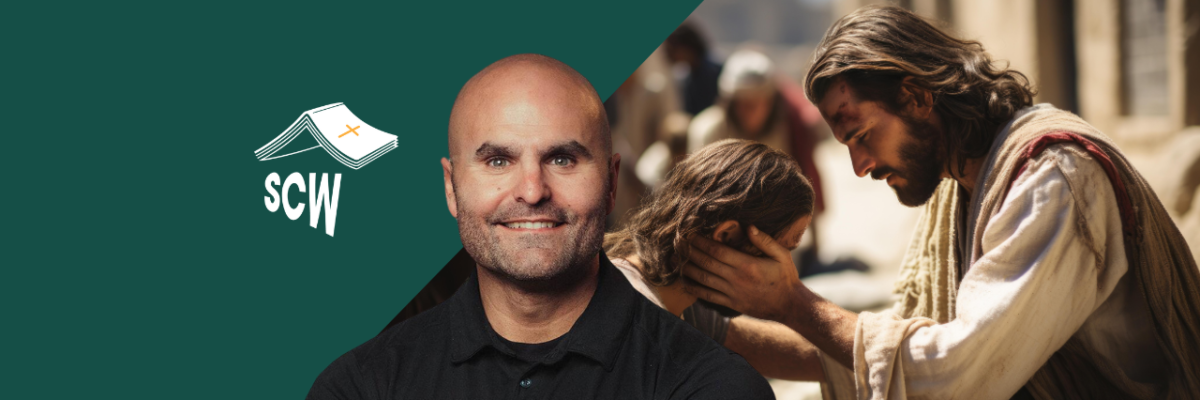
Episode 94: Year B – 23rd Sunday of Ordinary Time
In this episode, we focus on several details that come from the Gospel reading for this upcoming 23rd Sunday of Ordinary Time, Year B, taken from Mark 7:31-37, two of which tie into the first reading, taken from Isaiah 35:4-7a. The key apologetical themes for the details that tie into the first reading are Jesus’ Messiahship and Divinity. The other details in the Gospel reading give rise to the opportunity to talk about the historical reliability of the event recorded in this Gospel reading, which is Jesus’ healing of the deaf man, along with the Sacraments.
Readings: Click Here
Looking for Sunday Catholic Word Merchandise? Look no further! Click Here
Hey everyone,
Welcome to The Sunday Catholic Word, a podcast where we reflect on the upcoming Sunday Mass readings and pick out the details that are relevant for explaining and defending our Catholic faith.
I’m Karlo Broussard, staff apologist and speaker for Catholic Answers, and the host for this podcast.
In this episode, we’re going to focus on several details that come from the Gospel reading for this upcoming 23rd Sunday of Ordinary Time, taken from Mark 7:31-37, two of which tie into the first reading, taken from Isaiah 35:4-7a. The key apologetical themes for the details that tie into the first reading are Jesus’ Messiahship and Divinity. The other details in the Gospel reading give rise to the opportunity to talk about the historical reliability of the event recorded in this Gospel reading, which is Jesus’ healing of the deaf man, along with the Sacraments.
So, here’s the Gospel reading, again, taken from Mark 7:31-37:
Again Jesus left the district of Tyre
and went by way of Sidon to the Sea of Galilee,
into the district of the Decapolis.
And people brought to him a deaf man who had a speech impediment
and begged him to lay his hand on him.
He took him off by himself away from the crowd.
He put his finger into the man’s ears
and, spitting, touched his tongue;
then he looked up to heaven and groaned, and said to him,
“Ephphatha!”— that is, “Be opened!” —
And immediately the man’s ears were opened,
his speech impediment was removed,
and he spoke plainly.
He ordered them not to tell anyone.
But the more he ordered them not to,
the more they proclaimed it.
They were exceedingly astonished and they said,
“He has done all things well.
He makes the deaf hear and the mute speak.”
Now, the first thing I want to highlight is the general act of Jesus healing the deaf man with a speech impediment. On one level, we have here a miracle performed by Jesus, which is always apologetically significant. But on another level, this is revelation of the fulfillment of prophecy. And that prophecy is given to us in the first reading, taken from Isaiah 35:4-7a. Here’s what we read:
Thus says the LORD:
Say to those whose hearts are frightened:
Be strong, fear not!
Here is your God,
he comes with vindication;
with divine recompense
he comes to save you.
Then will the eyes of the blind be opened,
the ears of the deaf be cleared;
then will the lame leap like a stag,
then the tongue of the mute will sing.
Streams will burst forth in the desert,
and rivers in the steppe.
The burning sands will become pools,
and the thirsty ground, springs of water.
Notice that when “the ears of the deaf be cleared,” God will come in vindication. This is a prophecy of the coming Messianic age.
So, when Jesus heals the deaf man, it’s a revelation that he is ushering in the Messianic Age, and in turn that he is the Messiah. And the audience seemingly recognizes this, exclaiming, “He had done all things well. He makes the deaf hear and the mute speak.” Undoubtedly, they would have known the Isaiah prophecy.
This connection to Isaiah’s prophecy is further confirmed by Mark’s use of the Greek word magilalos, which is translated “speech impediment.” As Dr. Mary Healy points out in her commentary on the Gospel of Mark, which is part of the Catholic Commentary on Sacred Scripture New Testament series, this Greek word appears only once elsewhere in Scripture, in the Greek translation of the Isaiah passage that’s our first reading. Healy draws out the implication as follows:
This exultant promise refers to the joyful return home of the Jews after their exile in Babylon, but Mark is hinting that the Gentiles too are now heirs to these blessings. Previously deaf to God and mute concerning his saving deeds, now, in response to his mighty works of healing, they are able to hear his voice and sing his praises (pg. 146).
So, Jesus’ healing of the deaf man with a speech impediment signifies his Messiahship.
But, as Healy points out, there’s something else that this healing hints at: Jesus’ divinity.
Consider, for example, that Scripture ascribes the power to heal the deaf to God alone. Exodus 4:11 reads, “Who gives one man speech and makes another deaf and dumb? Or who gives sight to one and makes another blind? Is it not I, the Lord?”
Since Jesus performs the miracle seemingly by his own power, he is, by this act, revealing that he is equal in power to the Father—that’s to say, he’s divine.
Now, the next thing I want to focus on is a cluster of details, all of which pertain to the historical reliability of the event that’s reported.
First, notice Jesus “took [the deaf man] off by himself away from the crowd.” J.A. Flynn, in his commentary on Mark’s Gospel, which is his contribution to the A Catholic Commentary on Holy Scripture, explains the significance of this detail as follows:
In the exercise of his miraculous powers Jesus avoided ostentation. His humility in this respect was a contrast to the pretensions of false messiahs who sought to win the favour of the people by extravagant promises of miraculous deeds.
This humility of Jesus meets one of the criteria that scholars look to for determining the reliability of historical reports, namely, dissimilarity. This behavior, as Flynn points out, is dissimilar to reports of the “showing off” of ancient false messiahs. The purpose of the miracle is not to astonish or wow the crowd. It’s simply ordered to the healing of the individual.
A second detail is Jesus’ command for the people there to not tell anyone. Again, this shows Jesus’ humility and that he was not seeking admiration by the exercise of his powers, unlike ancient wonder workers. Such dissimilarity suggests that Mark is not just fabricating a story of one more wonder worker. Rather, Mark includes this detail because that’s the way it happened.
A third detail in our cluster of details supporting the historical reliability of the report is the vivid touches by Jesus—the touching of the man’s ears and tongue. We can also include Jesus’ spitting. Such vivid details suggests the account of an eyewitness.
Finally, we have in this passage what scholars call a Semitism. A Semitism is the presence of an Aramaic word within the Greek text, or a Greek expression that has an underlying Aramaic tradition. Such Semitisms strongly suggest a probable origin within a Palestinian community near the time of Jesus, thus precluding any possibility of legendary developments.
Jesus’ command, “Ephphatha!”— which means, “Be opened!” —is one such Semitism. As Healy explains, “Mark’s preservation of the original word in Aramaic shows how deeply this healing impressed itself on the memory of his disciples” (pg. 147).
Now, this Semitism further suggests historical reliability inasmuch as it’s preserved in the Greek by a Gentile author, Mark, who is writing to a Gentile audience. Preserving an Aramaic word wouldn’t have any traction with a Gentile audience. It simply wouldn’t resonate with them.
Of course, that just raises the question, “Why would Mark preserve such a word for his Gentile audience?” Well, he wouldn’t preserve it if he were fabricating the story, since it wouldn’t meet any need of his Gentile audience. Therefore, the only reasonable explanation for why he preserved it is because he heard Jesus say it.
So, we have four details that support the historical reliability of Mark’s report:
- The performance of the miracle in private,
- The command to not tell anyone about the miracle,
- The vivid touches, and
- The Aramaic word “Ephphatha.”
Now, the cool thing about establishing the historical reliability of Mark’s report is that it in turn provides us reason to believe the very healing itself, which means it’s historical reliability to believe Jesus was a miracle worker. And if that’s reasonable to believe, then it’s reasonable to believe everything Jesus taught, including his divinity.
Okay, there’s one last detail that I want to talk about, and it’s the idea of Jesus using material stuff and the touching of the body to bring about the healing (e.g., his spit and physical touch). This relates to the Sacraments insofar as it provides us with a sacramental principle: the use of matter and physical touch to administer blessings.
In this instance, matter and touch is a vehicle or instrument for the administering of physical healing. Jesus didn’t need these things. Yet, he still used them. If Jesus saw it fitting to use matter and touch of the body as a means to bring about physical healing, then it’s reasonable to think that he would see it fitting to do the same for spiritual healing, like in the Sacraments.
Jesus isn’t about operating merely on the spiritual realm. Rather, he incorporates the material world, which includes our bodies, into the spiritual realm. And this provides biblical grounds at least for the sacrament principle: the use of matter and touch of the body to communicate grace.
Conclusion
Well, my friends, that’s all the time we have for this episode of the Sunday Catholic Word. The readings for this upcoming 23rd Sunday of Ordinary Time, Year B, provides a plethora of material for apologetical discussions:
- Jesus’ messiahship,
- Jesus’ divinity,
- The historical reliability of Mark’s Gospel,
- The historical facticity of Jesus as a miracle worker and thereby the reasonableness to believe in Jesus’ claims to be divine, and
- The fittingness of the Sacraments within the economy of salvation.
As always, thank you for subscribing to the podcast. And please be sure to tell your friends about it and invite them to subscribe as well at sundaycatholicword.com. You might also want to check out the other great podcasts in our Catholic Answers podcast network: Cy Kellet’s Catholic Answers Focus, Trent Horn’s The Counsel of Trent, Joe Heschmeyer’s Shameless Popery, and Jimmy Akin’s A Daily Defense, all of which can be found at catholic.com.
One last thing: if you’re interested in getting some cool mugs and stickers with my logo, “Mr. Sunday podcast,” go to shop.catholic.com.
I hope you have a blessed 23rd Sunday of Ordinary Time, Year B. Until next time, God Bless!



